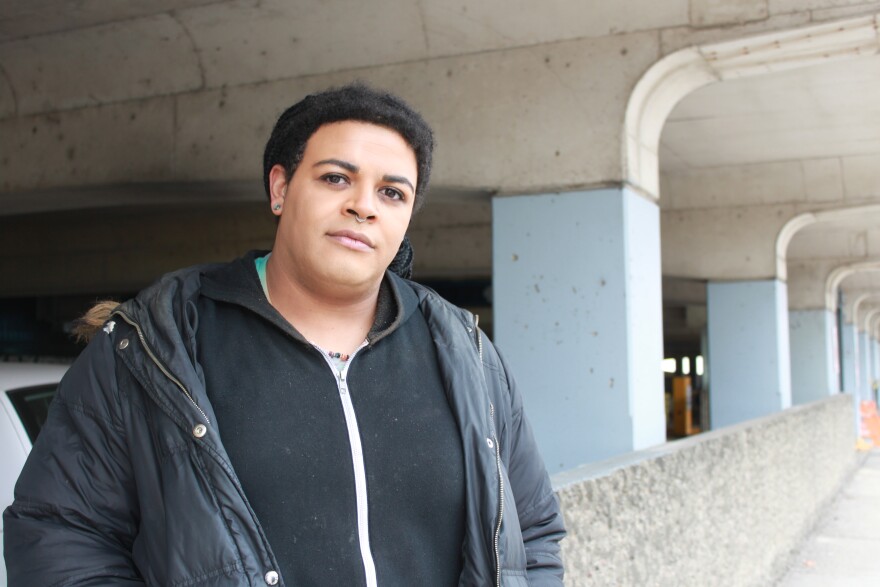BINGHAMTON, NY (WSKG)—Last month, a few dozen people met in the sanctuary of the United Presbyterian Church in downtown Binghamton. Scattered among the pews, they broke into groups to discuss how to improve housing conditions in the city.
Tactics ranged from advocacy and research, to monitoring the city’s eviction court and physically blocking evictions.
“All of that stuff is extremely important, and I can’t stress enough, not that difficult. It’s not difficult to get 20 people and surround a moving van,” Khamesi Black said to the crowd.
Black is a member of the Stakeholders of Broome County, an activist group that believes housing is a human right.
She grew up in Binghamton and has experienced housing instability throughout her time living in the area.
“More often than not I can’t afford to stay at one place so I have to move to another,” Black said. “I've had very few landlords who were willing to work with the tenants. They saw this as a business.”
Black said the pandemic has made things hard for her financially. She’s looking for jobs, but hasn’t had much luck getting an interview.
“The truth of the matter is I'm out of money. I, unfortunately, have to go back to work regardless of my level of comfort during a pandemic,” Black said. “But I can't get in.”
A trend in college towns statewide
Black said she doesn’t know how long she will be able to afford to stay in her current apartment. Finding a new place in the city has become difficult with some landlords preferring to rent to students, especially for many low-income tenants and families.
According to Cooper Sirwatka, director of operations at CNY Fair Housing, it's true of towns across upstate New York, including Ithaca, Oneonta, Syracuse and Oswego.
“Really a lot of the cities in our service area, because we cover a lot of colleges,” he said.
CNY Fair Housing, a non-profit that addresses housing discrimination, conducted testing in Binghamton as part of a 2015 report on impediments to fair housing in the city. The organization reported multiple instances of landlords that advertised student housing illegally, denying families with children the opportunity to live where they choose. That occurred even when the parent was a student.
College students who come to Binghamton from other places may also afford to pay more for off-campus housing, Sirwatka said.
“I think that that pushes up costs in every college town in our service area,” he continued, “but I will say Binghamton [University], Cornell, Ithaca [College], SU—sort of the colleges that are a bit more competitive to get into—we see that issue come up much more frequently.”
The City of Binghamton contracted with CNY Fair Housing to compile a 2020 report that has yet to be released.
"The same boat"
Black and other housing activists in Binghamton are calling on college students to join efforts to reverse this trend and improve the quality of housing, as well as tenant protections. That includes pushing for local "good cause eviction" legislation.
But direct action, Black said, could also look like showing up to city council meetings, or occupying vacant and neglected properties.
Since students perpetuate housing disparities whether they know it or not, Black said working with them could be a somewhat "weird dynamic." But both students and their neighbors, Black continued, are hurt by exploitative and discriminatory housing policies.
“We need everybody if we’re going to be able to bridge these divides and actually transform the landscape of Binghamton to one that people can actually thrive in," she said, "students and community included.”
The Stakeholders of Broome County has been hosting a series of summits for students and other tenants, like the one at the church on Nov. 8. In addition to strategizing steps forward, they discussed their common experiences.
Marlo Winters went to the meeting at the church with a few friends. She goes to Binghamton University and is living off-campus for the first time this year.
She has faced her own list of housing problems.
“Like my landlords are not local, the house I’m in is really not up to code, like we didn’t even have fire alarms until last week,” Winters said.
A lot of students, she added, move into houses off campus because they are more affordable.
“We’re like everyone, we need to be able to pay off our rent, and you know, be able to pay off our tuition and stuff,” Winters said. “So we’re all in kind of the same boat in that way.”
Because of that, she wants to help other community members in regard to housing, and not just those who are also students.
The Binghamton University Student Association will hold a housing town hall in collaboration with the Stakeholders of Broome County on Thursday, Dec. 2.




